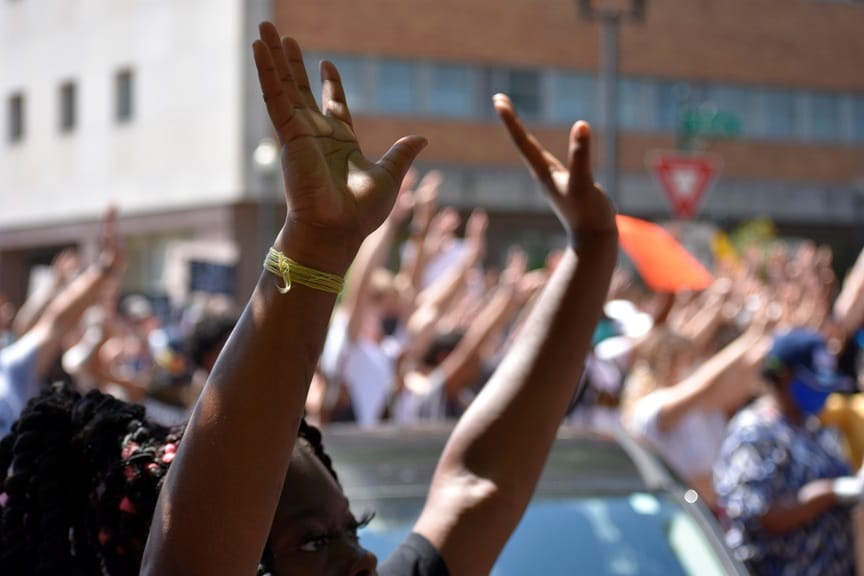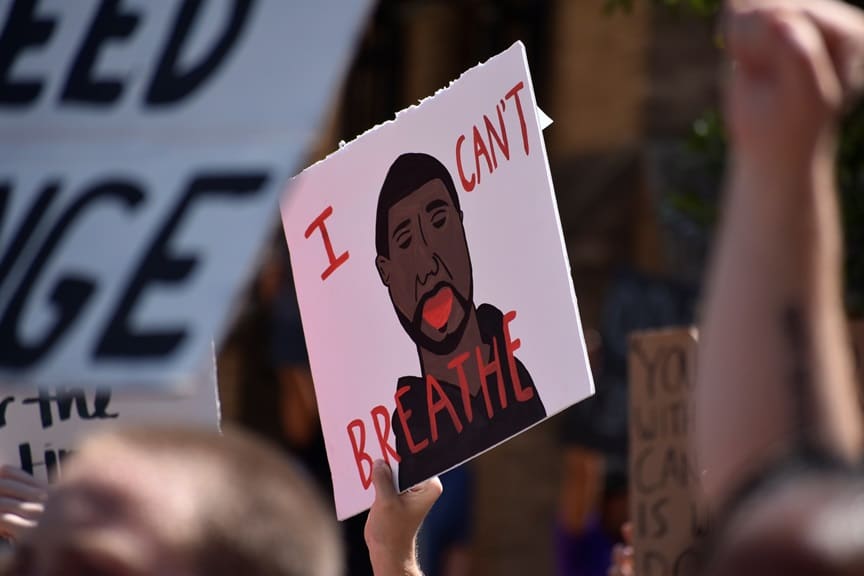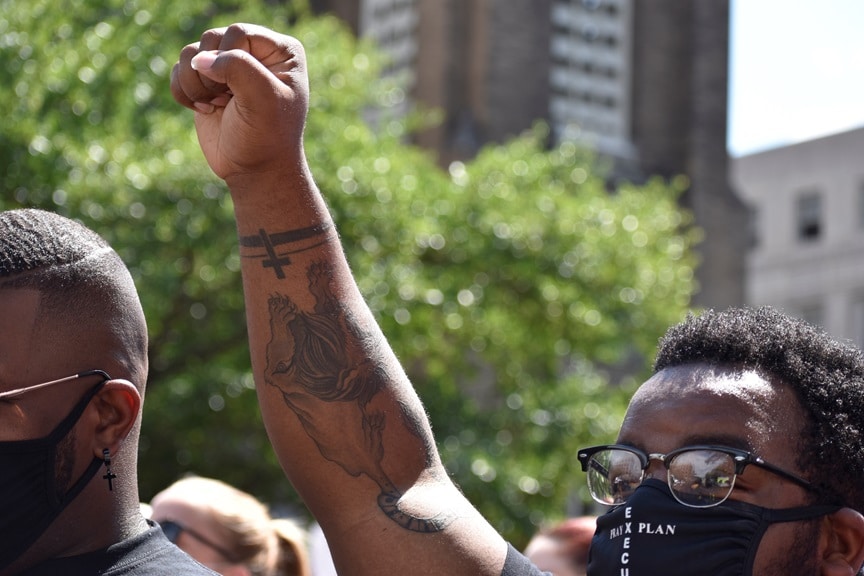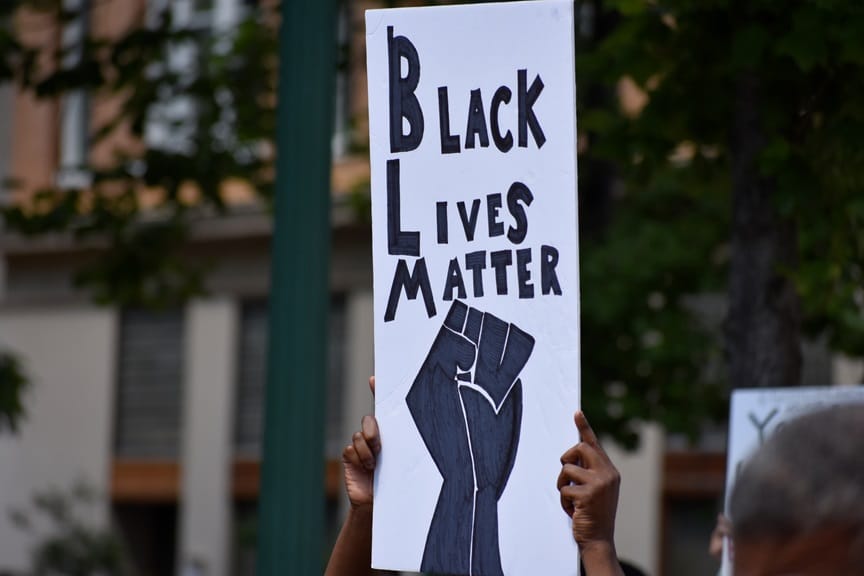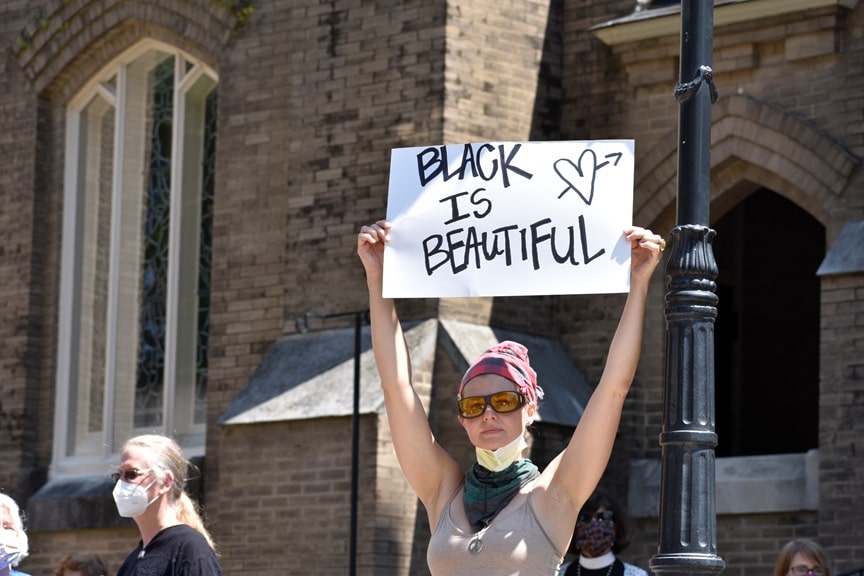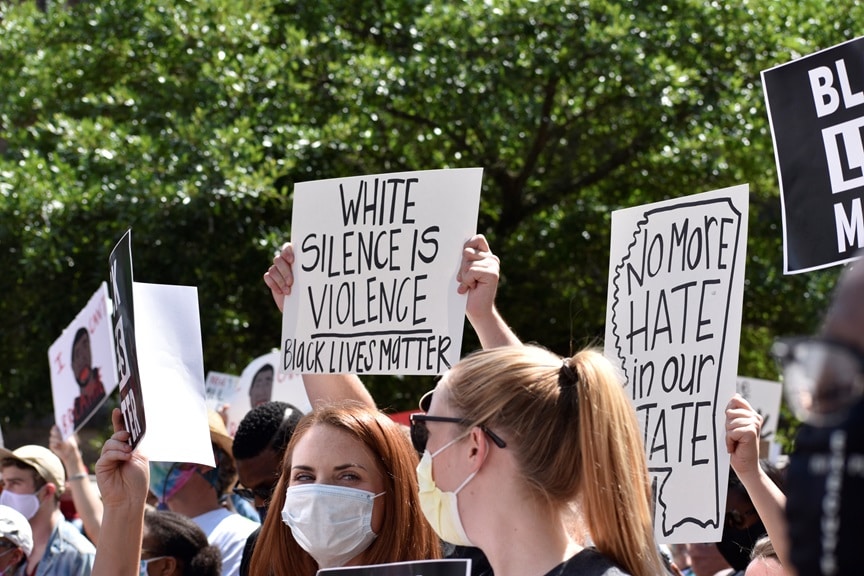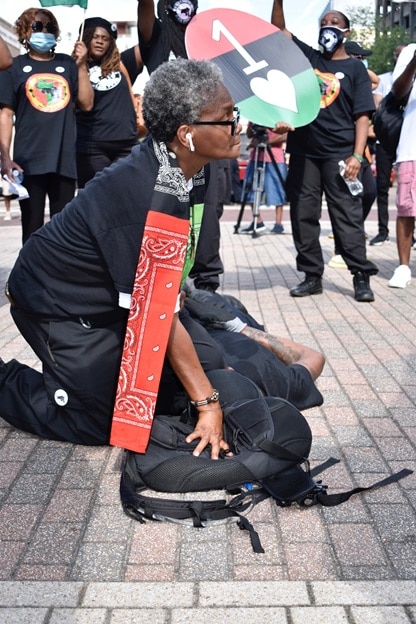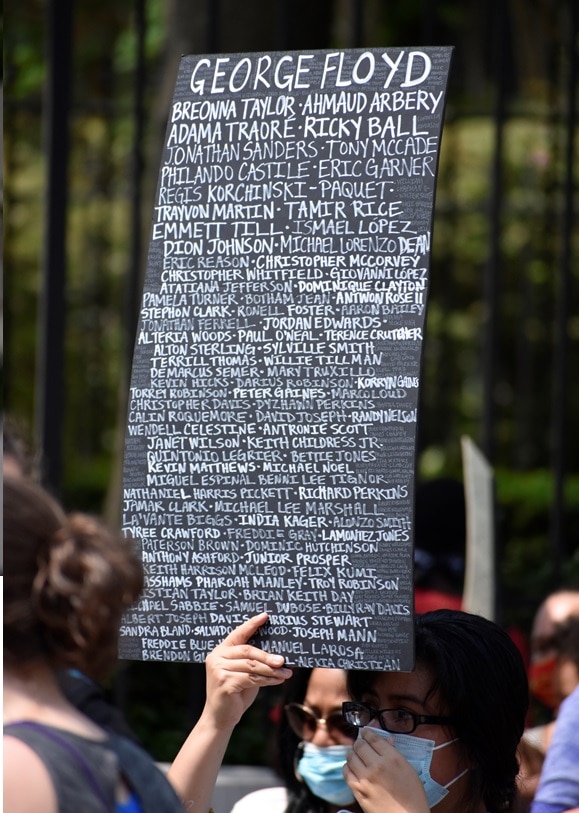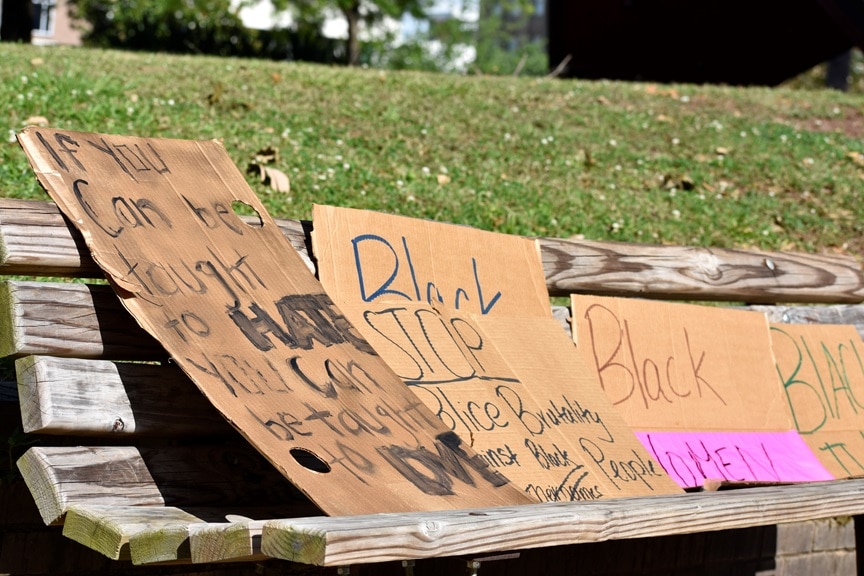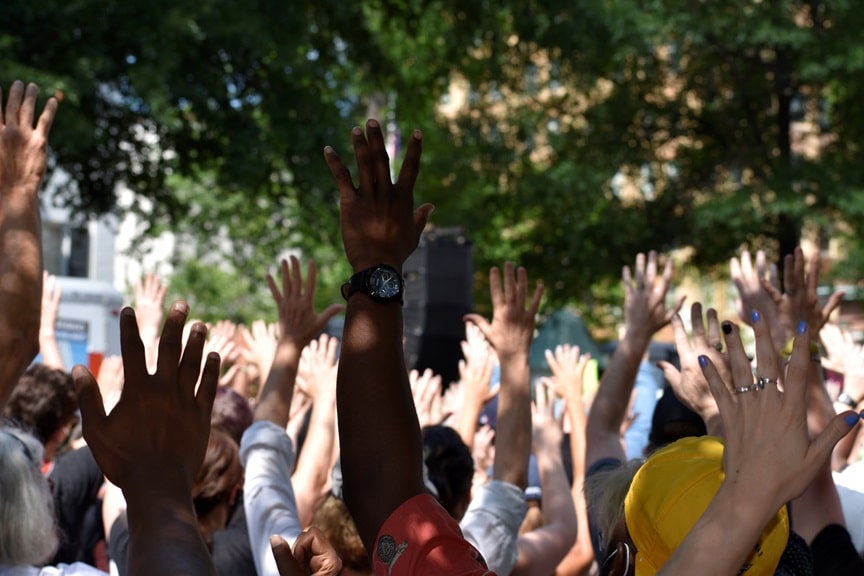2020 was a year like no other as Mississippians have had to deal with everything from the COVID-19 pandemic to one of the busiest Atlantic hurricane seasons in history. Even amid the negative, the state found a way to move forward in other realms such as the changing of the flag, as well as the ridding of a Jim Crow-era law.
Take a look back at everything that has happened in the Magnolia State during this surreal year below.
Tate Reeves sworn-in as Mississippi’s 65th Governor – 1/14
Governor Tate Reeves took the oath of office today as the 65th Governor of Mississippi.
In his first speech, as Governor, Reeves reflected on the first time he took an oath of office in the state capitol. “I was just 29-years-old when I first took an oath in this capitol, to serve the people of this great state. The last sentence of that oath hit me hard on that day – ‘So help me God’.”
Reeves said, the call to action by the oath of office is not a commitment to be perfect. Reeves said, “It is a commitment to seek the guidance of the almighty God to compensate for our human frailty. Our forebearers in Mississippi governance were not perfect, but they perfectly scripted this oath, and as your Governor, you have my commitment to seek God’s guidance and God’s will in all that I do.”
Reeves took a few moments to look at the road ahead. “Here is my promise; this will be an administration for ALL Mississippi.”
Governor Reeves continued by highlighting the two priorities of his administration. Reeves said the first will be defending the loving culture that underpins quality of life. The second priority will be to grow the economy that lifts Mississippi families.
Reeves said, “A culture of love and kinship has knitted Mississippi families together and tied them to each other for ages. It is what makes us special in a fast-paced and transient world.”
Reeves said he would defend that culture against the erosion that frays societies. “I will work to make sure our state government’s functions reflect the love we have for each other. That will mean, taking care of foster kids. That will mean, getting special needs kids, the special help they need. And yes, it will mean, cleaning up corrections, to provide for the safety of our citizens, and the human dignity of all within the system.” Reeves also said there is a need to make sure that state government is not causing more problems than it solves.
Reeves also spoke about providing jobs for Mississippi families. “A growing, vibrant economy solves more problems than any government giveaway ever could. A government program helps for a month, but a good paying career helps a family for generations.”
Reeves said his mission is to spend every single day, creating a climate where good careers are plentiful while preparing Mississippians to pursue those careers.
Reeves said, to accomplish this goal, we must raise expectations. “It must not be our ambition to simply keep up with Arkansas or Alabama. It must be our goal to compete for the very best jobs in all the world. We can do it.”
Reeves emphasized workforce training as the key to obtaining competitive jobs. “I am committed to a history-making increase in workforce training in our state – a skills-based system that will be the envy of our nation”.
Reeves also asserted his plan to elevate public schools by saying, “That means a pay raise for every teacher.” Reeves said he has a new mission for Mississippi to have more national board-certified teachers, per capita, than any state in the nation. “It is a goal we can achieve and one worth achieving. We have done it before and we can do it again.”
Reeves said, “While we rebuild the way we train our workforce, from kindergarten, beyond high school, we will travel the world to find the job creators who want to be our partners. We will comb our state to find the companies that want to grow. We will lower barriers for innovation. We will do everything in our power to make sure, this is the easiest place in America to start and grow a business.”
Reeves, who served as State Treasurer and Lt. Governor, said, “The greatest preparation you gave me was the understanding that no Governor does this job alone. Leadership is an attitude of common purpose. It is the product of solidarity. It comes only when we all begin caring about each other, more than ourselves. That kind of leadership requires a sense of mission. Not just for our governor, and not just for our legislature, but a sense of mission for all Mississippi.”
Reeves asked every Mississippian to join him in that mission. “We must care about each other enough to overcome our differences. We must be faithful to each other enough to outlast our shortcomings. And, we must be committed to each other enough to raise our expectations.”
In closing, Reeves said, “When I first took that oath of office in 2003, I did not know how long my service would last. All I knew was that you, the people of Mississippi, had demonstrated a faith in me that I might never be able to meet. I have never underestimated your trust. I have never forgotten the oath to pursue service with the help of our God. I will wake up every day, working to bring us together, to make our state be all it can be. Work that can be done by all of Mississippi, for all of Mississippi.”
Mississippi Lottery Corporation announces first transfer to the state – 1/22
The Mississippi Lottery Corporation has announced its first transfer of net proceeds to the state.
In a news release, the MLC stated that the first transfer of $7,621,232.37 was made to the ‘Lottery Proceeds Fund’ in the Mississippi State Treasury on January 17.
Lottery sales began on November 25, 2019, with the introduction of four instant scratch-off games. Sales through the first eight weeks of sales ending January 18, 2020, have exceeded $80.7 million. So far, players have claimed more than $44 million in prizes.
“We are very pleased with these early results,” said MLC President Tom Shaheen. “Retailer and player support have been fantastic in our collective efforts to raise money for roads, bridges and education needs for the state of Mississippi.”
The Mississippi Department of Transportation recently designated the first $30 million of lottery proceeds for pavement restoration projects. Until 2028, the first $80 million of revenue from the lottery each year will be put toward infrastructure, and anything further will be placed in the state’s ‘Education Enhancement Fund’.
Shaheen stated that as the number of available lottery games grows, so will the number of retailers across the state.
“Retailers have earned more than $4.8 million in commission through January 18,” he continued. “As of January 21, 2020, the MLC has more than 1,400 active selling retailers. We anticipate having approximately 1,500 retailers by the time Powerball® and Mega Millions® go on sale on January 30.”
The MLC is required to transfer net proceeds within 20 days following the close of each calendar month.
Governor Reeves orders closing of Unit 29 at Parchman – 1/27
During his ‘State of the State’ address, Governor Tate Reeves announced that he has ordered the Mississippi Department of Corrections to begin the process of closing Unit 29 at the Mississippi State Penitentiary at Parchman.
Amid the ongoing unrest within the MDOC, Unit 29 has been a central location for violence and gang-activity as many have questioned the living conditions within the unit which houses some of the state’s most violent inmates.
Governor Reeves visited the facility last week and said that he had seen enough.
“There are many logistical questions that will need to be answered—we’re working through that right now. But I have seen enough. We have to turn the page. This is the first step, and I have asked the Department to begin the preparations to make it happen safely, justly, and quickly,” he said.
During his first address to the state, the Governor also discussed what needs to be done to improve Mississippi’s prison system in the long run.
“All Mississippians must be able to trust that the people in charge of this system are acting with competence to keep them safe. We must be able to trust that the corrections officers operating in these prisons have the tools that they need to do their jobs, and that they are compensated fairly. We must be able to trust that this system shows a baseline level of respect to those who find themselves within it. We must administer justice fairly, respecting the dignity of all within our prison walls. It was a great Christian martyr of the 16th century who saw a group of prisoners headed to the executioner and said, “there but for the grace of God, go I.” We must carry that same spirit of empathy as we embark on this mission,” Reeves said.
Tommy Taylor was recently named interim MDOC Commissioner while the search for a permanent replacement continues. Commissioner Pelicia Hall stepped down earlier this month.
Over the last month, 12 inmates – including 2 over this past weekend – have died in the custody of the Mississippi Department of Corrections.
State Auditor investigates “largest public embezzlement case in Mississippi history” – 2/5
New information has come to light in the ongoing investigation into what State Auditor Shad White has called the “largest public embezzlement case in Mississippi history.”
Last week, former Department of Human Services Executive Director John Davis and five others were arrested following an 8-month long investigation that revealed that Davis and his co-conspirators allegedly obtained millions in public funds from the Temporary Assistance for Needy Families (TANF) program administered by DHS, and used a variety of business entities and schemes to defraud the taxpayers.
While no specific dollar amount has been made public, White has stated that the loss already exceeds any embezzlement scheme in the records of the Auditor’s office which dates back 20 years.
The investigation began following a tip from a previously unknown whistleblower, who has now been identified as former Governor Phil Bryant.
“We would not have found out about this without somebody coming forward to the Auditor’s office and letting us know, and that person, in this case, was Governor Phil Bryant,” White explained during an appearance on the Gallo Show on SuperTalk Mississippi this morning.
White stated that DHS employees alerted the then-Governor to the alleged wrongdoings within the department, and the investigation began immediately after Bryant came to the Auditor’s office with the information.
In addition to Davis, the five other suspects in the scheme include former DHS employee Latimer Smith; Dr. Nancy New, owner and Director of the Mississippi Community Education Center (MCEC) and New Learning, Inc.; Zach New, Assistant Executive Director of MCEC; Anne McGrew, accountant for MCEC; and Brett DiBiase.
The list of exact charges has not been released, but the allegations against the individuals were detailed in a press release from White’s office last week.
“Davis and Smith stand accused of fraudulently manufacturing documents to enrich Brett DiBiase using TANF money. Davis and Smith created invoices to pay DiBiase TANF funds for teaching classes about drug abuse, but DiBiase was in a luxury rehabilitation facility for his own drug use in California at the time and did not perform the services. Davis and Smith created documents and arranged payment knowing DiBiase was not performing the work he was hired to perform.
Nancy New and her son, Zach New, stand accused of using the News’ non-profit, MCEC, to pay for DiBiase’s drug treatment using TANF funds. At Davis’ direction, MCEC used TANF money received from DHS to pay for DiBiase’s opioid treatment at the Rise in Malibu facility. The documentation submitted by the News claimed this was to pay DiBiase for conducting training classes that never, in fact, took place.
The News also stand accused of transferring millions in TANF funds to their private businesses. They then converted funds to their personal use and concealed the conversion through various fund transfers, fraudulent documents, at least one forged signature, and deceptive accounting measures.
Finally, Davis and the News are accused of creating a fraud scheme to take TANF funds to pay for personal investments in medical device companies (Prevacus, Inc., and PreSolMD, LLC) in Florida.”
On Thursday, U.S. Attorney Mike Hurst released a statement explaining that the FBI had not been made aware of the ongoing investigation and learned about it along with the general public. White said that “all the violations that were uncovered were violations of state law,” but as the investigation continues, it will broaden in scope. The Auditor’s office was set to meet with the FBI this morning.
“Now is the time to bring every investigative resource together to make sure we get to the bottom of all of this, “White said.
During his interview with Paul Gallo on SuperTalk Mississippi, White urged the legislature to order a “full forensic audit” of DHS to be handled by an independent CPA firm to determine the full extent of the scheme. If this is done, White says this will provide the most complete look at the case.
“We will have had the most exhaustive & transparent look at a state agency in Mississippi so far,” White said.
Pearl River Flooding Event: Preliminary damage report – 2/16
Due to the severe weather that impacted the state starting February 10th through February 14th, the Mississippi Emergency Management Agency (MEMA) received damage reports from affected counties and continues to assist with response efforts.
At the time of this report, the Pearl River is expected to crest early Monday morning, February 17, 2020 between 37.5 feet to 38 feet.
On Saturday, Governor Tate Reeves declared a state of emergency in response to flooding in Central Mississippi around the Pearl River. Coordinating with federal, state, and local partners, first responders and resources are on standby to be deployed for an immediate response.
“This is a historic flood. With projections showing the potential of this being the third-worst flood in Mississippi history, I have declared a state of emergency to deploy the necessary resources to take care of all Mississippians impacted. I encourage everyone out there to prepare. Have a plan to protect yourself and your loved ones.” said Governor Tate Reeves.
Also on Saturday, the Department of Wildlife and Fisheries executed 159 door to door knocks and were able to alert 510 individuals of the flood in an effort to evacuate the areas.
The Office of Homeland Security performed 4 assisted evacuations during the day Saturday, in Edwards and Terry in Hinds County. No evacuations were needed last night.
So far, eighteen counties submitted damage reports to MEMA. Four injuries were reported.
The following damage reports serve only as initial assessments from the county emergency management offices and can change as MEMA receives additional reports and assessments.
Updated damage reports by county (numbers subject to change):
- Attala: Flash flooding
- Carroll: Flash flooding, four roads closed
- Clay: 130 homes affected; eight roads with damage; 10 roads closed
- Copiah: Five roads closed, 120 sandbags distributed; 14 roads affected impacting 83 homes; two high water vehicles deployed to Hinds County
- Greene: four homes minor damage
- Grenada: four injuires due to hydroplaning; 10 homes affected; two roads destroyed, six roads with minor damage.
- Leake: 23 homes damaged; 12 roads damage; levee breach with five homes evacuated
- Leflore: 10 roads closed due to debris and flooding
- Lowneds: 10 homes damaged, 15 roads closed due to flooding
- Washington: 17 homes damaged, one road with major damage
- Yazoo: 30 homes damaged, 15 roads closed; 12 people displaced
MSDH reports Mississippi’s first case of coronavirus – 3/11
The coronavirus outbreak has officially reached Mississippi.
The Mississippi State Department of Health has reported its first presumptive positive case of COVID-19. Final verification will come from the Centers for Disease Control and Prevention (CDC).
The MSDH stated that the individual is a man from Forrest county that recently traveled to Florida. After confirmation by the Mississippi State Department of Health’s Public Health Laboratory, the patient voluntarily isolated himself at home to prevent further transmission to others. The patient was not hospitalized.
The Mississippi State Department of Health is conducting further investigation to limit the spread of the virus from this case.
We’ll have more details on Mississippi’s hirst #coronavirus case following our press conference at 11:00 a.m. tomorrow. Forrest County residents and all Mississippians are NOT considered at additional risk from this case, and should continue to practice basic protective hygiene.
— MS Dept of Health (@msdh) March 12, 2020
According to a news release, Governor Tate Reeves is fully aware of the situation and remains in close contact with the State Health Officer for all elements of COVID-19 response.
CDC statistics currently show 938 confirmed cases in the U.S. with 29 deaths.
State Health Officer Dr. Thomas Dobbs will release additional information and guidelines to Mississippians at an 11:00 press conference tomorrow morning.
Schools close following state of emergency declaration 3/16
Schools and classrooms across the state are empty this Monday morning as the coronavirus outbreak continues.
During his state of emergency declaration on Saturday, Governor Tate Reeves asked Mississippi schools to extend their Spring Breaks through at least March 20th. While the final decision must be made by each individual school district, many have followed the Governor’s recommendation.
Because the Governor declared a state emergency, state law gives the Mississippi State Board of Education the flexibility to waive the requirement that schools operate for 180 days.
The Mississippi High School Activities Association has also announced the suspension of all sanctioned contests and activities through March 29th at the earliest.
“We urge our member schools and their communities to take every possible precaution to remain safe and healthy,” said MHSAA Executive Director Don Hinton. “MHSAA leadership is working diligently to adjust to this rapidly evolving situation and will share updates as soon as possible. Thank you for your patience and understanding as we continue to work through this unfortunate situation together.”
This suspension applies whether or not a school is open or closed during this timeline.
Mississippi’s eight public universities have also extended their Spring Breaks and will shift to online courses when the semester resumes.
MSDH reports state’s first coronavirus-related death – 3/19
Health officials have confirmed Mississippi’s first coronavirus-related death.
According to the State Department of Health, the Hancock County man was between the ages of 60-65 and suffered from “chronic underlying conditions”. He died in a Louisiana hospital.
“I am extremely saddened to report this death. My heart goes out to this gentleman’s wife and family. While we knew it was a strong possibility that we would soon have a COVID-19 death, it doesn’t make it any easier to handle,” said MSDH State Health Officer Dr. Thomas Dobbs, “Many people will survive this virus with mild to severe symptoms, but we remain very concerned for those over 65 and immunocompromised populations – those most at risk to infection from this virus.”
Governor Tate Reeves expressed his condolences for the man and his family.
“As the coronavirus outbreak began claiming lives across the world, we knew this would eventually hit Mississippi. But that doesn’t make it any easier for Mississippi to lose one of our own. Elee and I are praying for all their loved ones and their community as we all deal with this tragic loss,” Governor Reeves said.
As of Thursday afternoon, the MSDH is reporting 50 cases of the virus and 602 Mississippians have been tested.
Dr. Dobbs stressed that, as the virus spreads rapidly, prevention has never been more important.
Preventive measures Mississippians can take include the following:
Wash your hands frequently and thoroughly, especially after coughing or sneezing, blowing your nose, and using the bathroom. Effective handwashing takes about 20 seconds, and includes cleaning under fingernails, between fingers, and washing the back of hands as well as the front.
- Stay home if you are sick and avoid close contact with anyone who is ill.
- Cover your coughs and sneezes. When possible, cough, sneeze or blow your nose into a tissue, and throw the tissue away.
- If you are sick, especially with shortness of breath, severe cough, fever or severe chest pain, call a doctor or healthcare provider for instructions on being safely examined.
- Avoid social gatherings where 10 people or more would come into close contact.
- Practice social distancing.
Governor Reeves issues statewide ‘shelter-in-place’ order – 4/1
Governor Tate Reeves has issued a statewide ‘shelter-in-place’ order for Mississippi.
Following recommendations from the state’s top health experts, Governor Reeves announced the decision this afternoon after initially issuing such an order for Lauderdale County on Tuesday.
The shelter-in-place will begin this Friday, April 3, 2020 at 5:00 PM and be in effect until Monday, April 20, 2020 at 8:00 AM.
The Mississippi State Department of Health determined that the state has now reached a critical point in the cycle of the outbreak and stressed the need for a statewide order. This morning, the state’s total number of cases exceeded 1,000.
According to the Governor’s office, Mississippi is rapidly increasing testing and strictly enforcing quarantines for anyone that investigators believe has been exposed to the virus.
President Trump approves disaster declaration following Easter storms – 4/17
As recovery efforts continue following Easter Sunday’s storms in Mississippi, help from the federal government is on its way.
President Trump has approved a ‘Federal Disaster Request’ made by Governor Tate Reeves after the devastating storms. Governor Reeves spoke to the President on Thursday, and the declaration was approved shortly after.
“Words cannot express how grateful I am for President Trump’s quick consideration to approve Mississippi’s request to help our people during this difficult time. The storms that hit on Easter Sunday were truly devastating. People are already struggling under the weight of COVID-19. By lending this helping hand, we are letting Mississippians that they are not alone. Thanks to our strong relationship with the White House, we can provide the resources necessary to reinforce our efforts to help people get back on their feet,” said Governor Tate Reeves.
At this time, the declaration includes Covington, Jefferson Davis and Jones counties but it could be expanded as damage assessments continue. The tornado that tore through these three counties has been rated as an EF-4 storm with winds reaching at least 190 mph. At 2 1/4 miles wide, the system becomes the widest tornado on record in the state of Mississippi and the third widest tornado on record in the United States.
In all, the severe weather tragically resulted in 14 fatalities across the state and 33 counties reported damage. In the three approved counties, MEMA says that 333 homes were damaged or destroyed.
Legislature allocates $300 million for small business relief – 5/21
Governor Tate Reeves has signed SB 2772, which allocates $300 million of Mississippi’s CARES Act funding for small businesses impacted by the COVID-19 pandemic.
Passed by the Legislature late last week, the bill will provide relief to businesses through two separate programs, the first of which will be a $60 million direct payment program. Businesses that were forced to shut down due to a government order — hairstylists, fitness centers, and some restaurants — will receive a $2,000 check.
The remaining $240 million will be distributed in the form of grants of up to $25,000 to small businesses with 50 employees or less.
While more information on the application process will likely be released in the coming days, Lt. Governor Delbert Hosemann explained that, for the first 60 days, $40 million from the grant program will be set aside for minority-owned businesses. Also, for the first 21 days of the application period for the grant program, only businesses which did not receive funds from the Paycheck Protection Program or Economic Injury Disaster Loan Emergency Advance, any other federal program, or compensation from business interruption insurance will be considered.
The programs are available to all small businesses, including sole proprietorships. The direct payment program will be administered by the Mississippi Department of Revenue and the Department of Finance and Administration, and the grant program will be administered by the Mississippi Development Authority.
Mississippi received a total of $1.25 billion from the CARES Act. With the remaining $900 million, Governor Reeves has discussed the possibility of funding workforce development efforts, distance learning improvements and left the door open for additional relief for small businesses.
After an initial disagreement over who held the authority to spend the CARES Act funding, Governor Reeves and Legislative leadership reached an agreement to work together on the plan. Lawmakers were then called back to the Capitol to pass the bill.
Dak Prescott pledges $1 million “to address systematic racism” – 6/3
Former Mississippi State and current Dallas Cowboys QB Dak Prescott is pledging $1 million to fight social injustice in the wake of George Floyd’s death.
Prescott announced on Instagram that the funds will help to “improve police training and address systematic racism through education and advocacy.” Floyd died in police custody last week after a Minneapolis police officer knelt on his neck for over eight minutes. The officer, Derek Chauvin, has been charged with third-degree murder.
View this post on Instagram
In the days since Floyd’s death, protests – both peaceful and violent – have broken out across the country.
In his post, Prescott went on to state that he does not believe that looting and violence are the answer.
“We will clean our streets and our communities. Not only the looting and violence, but most importantly, the racism, racial-profiling and hate,” he wrote.
In Mississippi, peaceful protests have occurred in several cities. Monday, Governor Tate Reeves expressed his support for those who are exercising their first amendment rights, while also stating that “there is no place for the anarchists and there is no place for the antagonists here in Mississippi.”
Thousands gather in downtown Jackson BLM Protest – 6/6
On Saturday afternoon, thousands of protesters gathered outside of the Governor’s Mansion in downtown Jackson to express their dissatisfaction with the all too often instances of racially motivated police brutality that still take place in this country.
The Time to Change the Flag is Now – 6/10
In 2001, the state of Georgia announced the removal of its state flag which included the Confederate battle emblem, making Mississippi the last state to feature the symbol of oppression on its flag.
19 years later, one would think Mississippi would have already changed the flag by now, however, that would be wrong as the state’s controversial banner continues to be the center of conversation in the Magnolia State.
It’s time for that conversation to end; it’s actually been time for that conversation to end, and some legislators are beginning to finally take notice, in large part due to the ongoing protests across the state, of the negative effect the Confederate emblem has on not only the image of Mississippi but the hearts of Mississippians.
This past weekend at the historic Black Lives Matter protest in downtown Jackson, 4,000 protesters—many of whom were carrying the “Stennis Flag,” a frontrunner to replace the current state flag—gathered and marched in honor of the countless victims of police brutality and systemic oppression.
Thousands of Mississippians support the Stennis Flag becoming the new state flag
Outside of the Mississippi State Capitol, in between chants of “No Justice, No Peace” and “Black Lives Matter,” a powerful chant of “Change the flag!” arose from the unified voice of protesters.
The demonstration in what could be recorded as the largest protest in the state capital since the Mississippi Freedom Summer of 1964 proved more than influential as a group of bipartisan lawmakers, with the blessing of Speaker of the House Philip Gunn, have now joined forces to draft a resolution to change the state’s flag.
“There is huge momentum and excitement right now,” Laurin Stennis, the local artist who designed the Stennis flag, said. “We have an opportunity here to light a candle in the darkness.”
Stennis, the descendant of segregation leader Senator John C. Stennis, is using the flag to not only put a stop to the oppression that takes place every day in this state but to show that her family has evolved from its Jim Crow-era ancestors.
“I think some folks when they see Stennis, they think it’s named for John C. Stennis,” Stennis explained. “I would have a reservation about that too. Luckily, it is not named after him…I originally was trying to call it the ‘Declare Flag,’ and that was not catching on.”
The flag, created by Laurin in 2014, features a large blue star encircled by 19 smaller stars on a white field, flanked by red bands.
“This is year six, and I think we are at a moment where we have got a shovel-ready solution that is beautiful, positive, bipartisan [and] 100 percent grassroots,” Stennis continued. “That’s the way things should be done in Mississippi, and I think we’re ready.”
The 20 stars represent the fact that Mississippi was the twentieth state to join the Union in 1817. The encirclement of the 19 stars symbolizes the pattern often used by indigenous people in both artwork and ceremonial clothing. The red memorializes the blood shed by Mississippians, “civilian or military,” fighting for liberty and justice for all.
As if the thousands of protesters chanting for a change to the flag was not enough, a poll was recently put out in which 75.7 percent of voters chose to support the Stennis Flag as the new flag to represent Mississippi.
The people have made their voice clear. Now, it’s up to state leaders to determine what’s next for an issue that should have been resolved long ago.
Senate Committee unanimously confirms Cain as new MDOC leader – 6/16
The Senate Corrections Committee voted this morning to unanimously confirm Burl Cain as the new Commissioner of the Mississippi Department of Corrections.
Commissioner Burl Cain was unanimously confirmed today to lead the Mississippi Department of Corrections following a hearing before the state Senate Corrections Committee at the Capitol. “We are going to hit the ground running,” Cain said. “Failure is not an option here.” pic.twitter.com/Y7dyo6zVVa
— MDOC (@MS_MDOC) June 16, 2020
Appointed by Governor Tate Reeves in late May, Cain was confirmed by a unanimous vote during a Senate confirmation hearing this morning. During the hearing, Cain reiterated his intent to implement a system that emphasizes “moral rehabilitation.”
“Moral people don’t steal your lawnmower. Morality is the basis of rehabilitation,” he said. “My passion is to change corrections in this whole country, but if we change Mississippi then we are going to prove that it works and it will work, therefore failure here is not an option for me.”
Cain must now be approved by the full Senate.
Prior to arriving in Mississippi, Cain was formerly the longtime warden of Angola Prison in Louisiana, which was once considered to be one the “bloodiest prison in America.” During his introduction, Governor Reeves credited Cain with turning things around at Angola.
“He brought faith, security, safety, dignity and pride to the prison,” Governor Reeves said on May 20. “They went from beatings to bible studies. He transformed America’s bloodiest prison into the model of success for the nation.”
The Mississippi State Penitentiary at Parchman has been at the center of many conversations surrounding the unrest in Mississippi’s prison system, and while some have called for its closure, Cain remains committed to its reform.
“If I close Parchman, then I’ve admitted failure because we have to fix Parchman,” Cain explained. “To close it is not an option because it is our Achilles heel and that is what we are judged by. So, to close it means that we couldn’t fix it. We’re going to fix Parchman and I’ve already started that.”
Cain said that during his visit to the facility, he was not satisfied with conditions and that they will reevaluate contracts with food and medicine vendors to ensure a higher standard.
Back in January, Governor Reeves announced the closure of Parchman’s most notorious unit — Unit 29.
Mississippi coaches unify at capitol to call for change to state flag – 6/25
This morning, coaches and athletic directors from all eight of Mississippi’s public universities descended upon the Mississippi capitol building to unify behind the cause to change the state flag.
The group of nearly 50 representatives from the universities, joined by Speaker of the House Philip Gunn, stood shoulder-to-shoulder in the rotunda of the state capitol to call for the removal of the controversial Confederate battle emblem from the state flag. Ole Miss head basketball coach Kermit Davis and Mississippi State women’s basketball coach Nikki McCray-Penson spoke with purpose as they looked toward a future with a flag that brings Mississippi residents together.
“We want change, all the coaches want change, the students want change, and they want it now. We have to get to a place of ‘what do we all agree on?’ We all agree that we would love to have a state that has great pride. I think we can all agree on that. We’d love to have a state that is flourishing economically, business-wise and educationally. For that to happen, we all know that the flag needs to change,” Davis said.
The Mississippi native also spoke of the role of athletics in effecting positive change across the state and how a new flag would allow each university to achieve its full potential.
McCray discussed her own experience with the flag that “screams hate” and how universities can lead the way in fostering change.
“Out student-athletes and our entire student body don’t just commit to compete and represent Mississippi State, they commit to compete and represent the entire state of Mississippi. Change is important for success for our athletic programs, our university and the entire state,” McCray said.
Mississippi State head football coach Mike Leach is relatively new to the state and his take on the flag is very straightforward.
“To me, it’s really quite simple. I mean, why do you have a state flag? To unify all the people in the state. If your flag doesn’t do that, change it. Does your flag bring business into the state or does it keep business out, if it doesn’t bring it in, change it. Does it draw athletes and people to the state or not? If not, then change it,” Leach said.
SportsTalk Mississippi’s Brian Hadad caught up with another newcomer to Mississippi, Ole Miss head football coach Lane Kiffin.
Ole Miss AD Keith Carter joined student-athletes and members of the athletic department in a recent ‘unity walk’ in Oxford, and he said that today was all about putting words into action.
“It’s so clear that this is about more than sports, Carter said. “Fortunately or unfortunately sometimes, sports is kind of the front door to a university or to a state, and we just felt like if we could lend our voice to that it would make a tangible action to some of the things we talked about.”
C-USA recently joined the NCAA and the SEC in banning postseason events from the state unless a change is made. The conference’s baseball tournament has been held in Mississippi 8 of the last 9 years and is set to return to Hattiesburg in 2022. USM baseball coach Scott Berry weighed in on what a new flag would mean for Mississippi.
“It’s a huge boost for our economy when we host those tournaments or if we’re able to host regionals, obviously that brings in a lot of dollars, but more importantly, it shows that Mississippi is a state that welcomes everybody and stands for everybody,” Berry said.
In addition to the press conference, the various groups met privately with lawmakers to discuss the effort to reach a 2/3 vote in both chambers to allow for the suspension of the rules, which would pave the way for a flag-changing vote. That bill could either decommission the current flag, place an initiative on the ballot, or adopt a new flag.
As it stands, it appears that the legislature is still short on the necessary votes. Governor Tate Reeves has continued to hold firm on his position that only a vote of the people should change the flag, but in a Facebook post late Wednesday, he acknowledged that a 2/3 vote would signify an inevitable outcome.
Today’s act of solidarity joins the message issued by countless state leaders and organizations who intend to help Mississippi move on from what they believe to be a divisive part of its past and present to create a better future.
History made: Mississippi flag to come down with passage of HB 1796 – 6/28
June 28, 2020, will be recalled as a pivotal day in Mississippi’s history as lawmakers have voted to remove the controversial state flag, which has flown over the state since 1894.
By a vote of 37 to 14, the Senate has sent HB 1796, ‘an act to establish the commission to redesign the Mississippi state flag’, to the Governor’s desk to be signed. A 91-23 vote in the House got the process started earlier today.
The bill tasks a commission, made up of nine appointees, to propose a new state flag design with two stipulations – no Confederate battle emblem and it must include the phrase ‘In God We Trust.’
The historic legislation will instruct the Department of Archives and History to immediately develop a plan for the “prompt, dignified and respectful removal” of the current state flag featuring the divisive emblem.
The proposed design of the new flag will be submitted to the Secretary of State’s Office by September 14th. It will then be voted upon by Mississippians on November 3rd. If that design doesn’t receive a majority of the vote, a new design would be submitted during the 2021 legislative session.
The commission will be made up of nine members – three appointees each from Speaker of the House Philip Gunn, Lt. Governor Delbert Hosemann and Governor Tate Reeves. The bill dictates that the governor’s appointments must include a representative from the Mississippi Economic Council, the Arts Commission and the Department of Archives and History.
These appointments must be made by July 15th and meetings would begin shortly after. The commission will be able to accept public comments.
Prior to the adoption of Saturday’s resolution to suspend the rules, Governor Reeves indicated that should we reach this point, he would sign a bill to take down the flag.
Throughout this process, several lawmakers have argued in favor of allowing Mississippians to vote on the current flag design. An amendment offered by Senator Angela Hill would have expanded the flag-designing committee to 17 members while keeping the current flag intact until April 6, 2021. On that day, Mississippians would have chosen between the current flag and three potential replacements. Hill’s demand for a roll call vote ended with a 32-19 vote to table to motion.
Many Senators spoke in favor of the bill to remove the current flag.
Senator John Horhn: “Today’s vote…is an affirmation of Mississippi’s future.” #msleg #msflag
— News Mississippi (@News_MS) June 28, 2020
“Let’s vote today for the Mississippi of tomorrow,” Simmons continued.
— News Mississippi (@News_MS) June 28, 2020
Senator Juan Barnett: “How long will we stand and say that we are a United States of America but an un-United state of Mississippi.” #msleg #msflag
— News Mississippi (@News_MS) June 28, 2020
Senator McMahan: “I’m just your every day regular guy. Don’t let this suit fool you…When I look at that Confederate flag, I must confess that I think of the Dukes of Hazzard and Daisy Duke,” but as he has gotten older, he understands the flag should be changed. #msleg #msflag
— News Mississippi (@News_MS) June 28, 2020
Senator Jordan: “It is time for the 3 million people of this state to come together.” #msflag #msleg
— News Mississippi (@News_MS) June 28, 2020
Following intensifying calls for change from state leaders, businesses, organizations, athletes and Mississippians from across the state, lawmakers acted quickly over this past week to gather the necessary votes to reach this milestone.
Lawmakers allocate remainder of state’s CARES Act $ as session wraps up – 7/2
Mississippi lawmakers have allocated the state’s $1.25 billion of federal funding from the CARES Act.
An initial $300 million disbursement developed two small business relief programs in the midst of the COVID-19 pandemic, leaving hundreds of millions of dollars left to be administered. Prior to wrapping up the 2020 session, lawmakers were able to decide on a spending package that will distribute the remaining funds to state agencies, cities and counties, and universities in addition to a few other entities.
According to Lt. Governor Delbert Hosemann, the funding breakdown is as follows:
$275 million for rural broadband & distance learning programs
$129,725,000 to hospitals, clinics, nonprofits, and childcare;
$40 million to the Mississippi Emergency Management Agency;
$70 million to cities and counties;
$20 million to the Mississippi Department of Corrections;
$15 million to tourism;
$100 million to public universities and community and junior colleges;
$10 million to private schools and universities;
$55 million to workforce training;
$1 million to elections;
$2.5 million to the judiciary; and
$181,775,000 to the Unemployment Insurance Trust Fund.
$50 million to be used at the Governor’s discretion.
Governor Tate Reeves had previously urged lawmakers to put as much as $500 million into the trust fund to avoid a tax surge on small businesses.
A more in-depth description of the $275 million for rural broadband and distance learning programs was provided by the lt. governor and can be seen below.
“The “COVID-19 Connectivity Act,” Senate Bill 3046 authored by Senator Joel Carter, establishes a grant program to expand service in unserved or underserved areas. The program makes $65 million available to Mississippi’s 26 member-owned electric cooperatives at a one-to-one match: for every dollar the co-ops spend, they will receive one federal dollar. Ten million is available for other service providers.
House Bill 1788, establishing the “Mississippi Pandemic Response Broadband Availability Grant Program,” provides $50 million to the Mississippi Department of Education (MDE) for grants to K-12 schools in areas without Internet connectivity.
Additionally, Senate Bill 3044, authored by Senator Dennis DeBar, appropriates $150 million to K-12 education to equip students with laptops and enhance distance learning in school districts across the State. Three hundred thousand dollars will be allocated to MDE to upgrade its data collection system; $129,700,000 will be allocated to public school districts based on average daily membership; and $20 million will be allocated to MDE to be distributed to school districts based on need.”
During the extended session, legislators also passed a number of other important bills, including the bill to retire the now-former state flag. Other bills of note include:
HB 1087 – A bill officially bringing an end to prohibition in Mississippi
HB 1559 – A bill to improve efforts to assist victims of human trafficking
HB 1295 – The ‘Life Equality Act of 2020’ to prohibit abortions from being performed because of race, sex or genetic abnormality except in a medical emergency.
SB 2594 – A bill extending Mississippi’s ‘Education Scholarship Account Program’ until 2024
SB 2725 – A bill to create the ‘Mississippi Hemp Cultivation Act’
Lawmakers finished their business at the capitol and could remain adjourned until October 5th as a result of the session-suspending resolution passed back in March. The resolution will allow lawmakers to return at any point between now and then if Lt. Governor Hosemann and Speaker of the House Philip Gunn agree that it is necessary with the new sine die of October 10th. One reason they may have to return soon is the fact that they left without passing a budget appropriation bill for the Department of Marine Resources, a decision that Governor Reeves criticized on Twitter.
Hattiesburg man pleads guilty in $510M “cream scheme” – 7/13
After being charged on 37 counts in the $510 million health care fraud scheme back in September, Mississippi businessman Wade Walters of Hattiesburg has pled guilty in what will, comically enough, go down as the “cream scheme.”
“We had a huge win for the people of Mississippi and, frankly, all American taxpayers last week,” U.S. Attorney Mike Hurst said. “The mastermind in the largest ever healthcare fraud in the state’s history pled guilty.”
Walters, 53, co-owns numerous compounding pharmacies and pharmaceutical distributors throughout the state. He pled guilty to conspiracy to commit healthcare fraud and conspiracy to commit money laundering last Thursday.
Instead of writing a prescription for each pain cream medication, which cost around $11,000-$14,000 per prescription, Walters distributed photocopied prescription pads in order to maximize profit.
The scheme, which took place between 2012 and 2016, targeted TRICARE, the health care benefit program serving the U.S. military, plus other private health care benefit programs.
“They had doctors prescribe medicine to people they have never seen, and these individuals figured out which types of medicine they could mix together to get the maximum amount of reimbursement from TRICARE,” Hurst continued.
Walters is facing up to 20 years behind bars and will be sentenced come October. According to Hurst, more than 13 others were also involved in the scheme.
Civil rights leader Charles Evers, brother of Medgar Evers, passes away – 7/22
Charles Evers, the longtime civil rights activist and older brother of Medgar Evers, has passed away at the age of 97.
Following his brother’s murder in 1963, Charles, a WWII veteran, returned to Mississippi where he succeeded Medgar as the field secretary of the NAACP. In the role, he continued to fight for equality while organizing boycotts, protests, and registration campaigns. In 1969, Evers made history when he was elected as the mayor of Fayette, Mississippi — becoming the first African-American mayor of a racially-mixed Mississippi city in the post-Reconstruction era.
Evers went on to run for Governor in 1971 and a Senate seat in 1978, but he was unsuccessful in both races.
Shortly after news broke of Evers’ death, Governor Tate Reeves issued the following statement on Twitter.
Rest In Peace, Charles Evers. He was a civil rights leader and a true friend to me and so many Mississippians. His memory will always be cherished and honored.
— Tate Reeves (@tatereeves) July 22, 2020
Evers endorsed Donald Trump ahead of the 2016 Presidential election, and the President took to Twitter to honor the “fearless” activist.
I am deeply saddened by the loss of my friend Charles Evers. Charles was a trail blazer in politics and a fearless leader, alongside his brother Medgar, for Civil Rights. pic.twitter.com/rL4bLbCY1D
— Donald J. Trump (@realDonaldTrump) July 22, 2020
Tributes continue to pour in following the passing of the civil rights leader.
“Charles Evers was a Mississippi and Civil Rights icon. His life serves as a reminder to never be afraid of challenging the status quo. He will be missed by many.” – Senator Cindy Hyde-Smith
“Charles Evers was an absolute classic. His rich and colorful story makes him unique among our state’s historical figures. His career covered the spectrum from his roguish youth to a respected civil rights leader, mayor, businessman, and radio host. Charles Evers was never afraid to challenge the accepted norms or fly in the face of political correctness. As an elected official he navigated the circuitous route from Freedom Democrat to Independent to Republican, even serving as a Trump elector in 2016. He used his powerful personality and platform to change Mississippi for the better. He was one of my favorites, and I doubt we will ever see another like him.” – Senator Roger Wicker
We are all saddened by the news of the passing of Mr. Charles Evers. In 1969, he became Mississippi’s first black mayor since Reconstruction of Fayette, MS. I extend my deepest condolences to the Evers family.” – Congressman Bennie Thompson
“Charles and his brother, Medgar, dedicated their time on this earth to the advancement of civil rights for all Americans and rigorously pursued justice for all. Following the tragic murder of his brother, Charles gracefully assumed Medgar’s position as head of the NAACP in Mississippi to continue his efforts to expand civil rights for African Americans in the Magnolia State. In 1969, he became the first African American mayor elected in Mississippi since Reconstruction, making Mr. Evers a symbol of the civil rights that he and his brother fought to advance. He served as an advisor and mentor to many public officials, from local governments to the President of the United States. Today, I join our Mississippi family in thankful prayer for his time with us and that he returned to our Heavenly Father having accomplished his goal of creating a better nation for all people.” – Congressman Michael Guest
“I knew Charles Evers for 40 years and considered him a friend. Few people live their lives with the confident ability to express themselves like he did. He will be missed in Mississippi.” – Lt. Governor Delbert Hosemann
According to the Mississippi Encyclopedia, Evers hosted the Medgar Wiley Evers Homecoming Celebration, which honors his brother’s life and legacy, since 1973.
What does “Back to School” look like? Corinth schools have reopened and are setting the bar – 7/28
As the COVID-19 pandemic continues, questions and concerns abound regarding a return to school, but one district in Mississippi is moving full steam ahead.
The Corinth School District resumed classes Monday, both in-person and virtually. Superintendent Dr. Lee Childress said Monday was their normal start date because Corinth is on a modified school calendar.
Childress says, while they were concerned, there was an energy and excitement when classes resumed. “We have been working since schools closed in March on what we would be doing when schools were able to reopen. I think people have been looking forward to the day. Now, don’t get me wrong, all of us, staff, and parents were apprehensive, and we still are apprehensive as we move through this, but, I think the fact we could begin to return to a normal way of life where children come to school, this community was willing to try it.”
For the last eight to ten weeks, Childress began weekly Facebook Live sessions to connect and inform. “We brought parents, community, and staff along the way in planning what we were going to do for the reopening. Three models of learning were proposed and we invited parents and administrators to provide input.”
Ultimately, a traditional model and a virtual model of learning were chosen for the district’s opening strategy. Childress said both models will run on a five day week. “We will have live and recorded lessons available for those children on the virtual model. We use a learning management system called Canvas which allows activities, videos, and instructional material to be contained within the platform so children can access it at home and get their work back to us.”
In the beginning, Childress said roughly 13 to 15 percent of parents chose the virtual option, but he is already seeing children who were originally scheduled to learn virtually, opting to return to a traditional classroom setting.
With regard to safety, Childress said a variety of measures are in place. “We are doing a thermal scanning of each child and staff member’s temperature each morning. So far, we have been able to complete most of those scans prior to the start of school. The scanners are working with ease and we’re able to accomplish that and get children in the classroom ready to begin their instruction.”
As most people are having to adjust to a new way of life, the children are also getting accustomed to the new face-covering requirements. “Children are required to wear a face-covering in Pre-K through third grade anytime they are moving about the building. We do give those children an opportunity to choose not to wear it in the classroom, however, when I was in the classrooms on Monday, a large number of them are choosing to wear it, and we certainly appreciate that. I think it will go a long way toward the health and safety of our students and our staff.” said Childress.
For older students, the rules are a little more stringent. Childress explains, “For grades 4 through 6, a face covering is mandatory, to be worn at all times, unless there is proper social distancing.”
So what does social distancing look like in school? Childress says, “We’ve been able to maintain, in many places, the six-foot distance. In some cases, we can’t quite get there, but we’ve created as much space as we can.”
Childress says other safety precautions are being observed. “We are making sure that we disinfect. We made sure that all classrooms with sinks, which we’re fortunate in Pre-K through 4th grade, they’ve all been stocked with soap and hand sanitizer. We’ve supplied the same to all areas of the Corinth School District. The practices we’ve put in place in the school are basically the same practices we should all utilize at home and within our community.”
What is happening in the Corinth School District can serve as a model for other districts who are determining what a return to school will look like for their students.
Childress says, “While these have been very stressful times, the great thing that I have seen is the collaboration that has occurred between teachers, administrators, staff, parents, and the community to make this possible. That’s extremely important. And one of the things I think we all need to remember is that schools are a reflection of our community. Our communities have to stay safe. We need to listen to what Governor Tate Reeves is saying, and what Dr. Dobbs is saying, regarding safe practices within our community. I think if we will adhere to those recommendations, we will go a long way towards having safer schools.”
Mississippi student-athletes forgo practice to protest social injustice – 8/28
Similar to the events following the death of George Floyd at the end of May, the shooting of Jacob Blake in Kenosha, Wisconsin has led to a wave of protests in society and the world of sports — with Mississippi State, Ole Miss and Southern Miss all taking part.
The Bulldog players decided to forgo Thursday’s practice to protest social injustice, choosing to meet at Unity Park in Starkville.
The players have departed, but they certainly appeared to be unified. pic.twitter.com/Ebr7WN9frM
— Brian Hadad (@brianhadad) August 27, 2020
“Black, brown, blue, it doesn’t matter, we love you all.” @IAmKobeJones
— Brian Hadad (@brianhadad) August 27, 2020
Ole Miss joined in the protest movement Friday with players organizing in front of the Oxford Courthouse following a march through the Square.
We stand united. pic.twitter.com/LNAFWBPO3g
— Ole Miss Football (@OleMissFB) August 28, 2020
According to the Sun Herald, Southern Miss players have opted not to practice today and will march on campus later today to protest racial injustice.
#WeWantChange ✊🏾 pic.twitter.com/Kc8Rv3OXaL
— Ky’el L. Hemby (@Asap_koddie) August 28, 2020
The Kenosha shooting has caused widespread protests, some peaceful and some violent, plus the postponement of games in the NBA, MLB, and NHL.
Mississippi Aquarium opens its doors – 8/29
15 years ago was one of the most detrimental days in not only this country’s history but in Mississippi’s history.
Hurricane Katrina virtually destroyed the entire Mississippi Gulf Coast. Taking the lives of over 200 people, destroying the homes of thousands, and causing billions of dollars in damage, the Category 5 hurricane is forever engrained in the minds of Mississippians.
However, today is a new day. This morning’s opening of the Mississippi Aquarium in Gulfport epitomizes how far the coastal region has come since 2005.
“I remember coming down Highway 90 days after Hurricane Katrina and trying to find Gulfport…and nothing was left,” former Governor Phil Bryant said. “We’re sailing into the future. Literally, we sailed out of the worst natural disaster in America’s history, and now, I think [the Gulf Coast] has become this iconic tourist destination.”
Gulfport Mayor Billy Hewes shared similar remarks to the former governor.
“This is a monument to all of us, to our ability to recover, to the resiliency of our community and our spirit,” he said at Friday’s VIP ribbon cutting.
The state of the art, $93 million facility, which is directly across the street from the beach, includes everything from an aviary to both salt and freshwater habitats to plenty of room for events and social gatherings.
The Mississippi Aquarium will also prioritize animal research and conservation through its Aquatic Research Center (ARC). The ARC, through partnerships with Southern Miss and Mississippi State, will provide a hands-on, educational experience for visitors, plus access to some of the nation’s top veterinarians.
In total, the project took three years to fully come into fruition, but now that the doors are finally open, the aquarium is estimated to bring in $350 million annually in economic impact and create around 100 jobs, according to Anthony Wilson of Mississippi Power.
For an inside look at the Mississippi Aquarium, you can scroll through the photo gallery below.
Commission selects “New Magnolia Flag” design to appear on November ballot – 9/2
When the Mississippi Flag Commission first met back in July, they had over 3,000 submissions to review. Today, they have selected the “New Magnolia Flag” as the proposed new state flag for Mississippi following the removal of the now-retired banner that had flown above the state since 1894.
The nine-member commission voted 8-1 to select the proposed design, which also won the non-binding public poll by a wide margin, over the “Great River Flag.”
The flag, originally designed by Kara Giles, Sue Anna Joe, and Rocky Vaughan with tweaks made by vexillologist Clay Moss, was created “to represent the forward progression of Mississippi” with the magnolia symbolizing the “state and the hospitality of our citizens.”
*A few changes, including a bolded font and slight change to the gold/yellow stripes, will be made.
The proposed design will now be submitted to the Secretary of State’s Office before being placed on the November 3rd ballot for Mississippians to vote upon.
Commission Chairman Rueben Anderson, the first African-American judge to serve on the state’s Supreme Court, concluded the meeting by commending the effort put forth by the other eight members and explaining that today’s action will help to move Mississippi forward.
“We’ll be on the bottom all of my lifetime, but my children & grandchildren will see us ascend, and it will happen because of what you have done to bring this great object to the people of Mississippi to vote on,” he said.
Prior to the final vote, the commission adopted a resolution to refer to the selected flag as the “In God We Trust Flag.” Oxford Mayor Robyn Tannehill suggested that a scientific poll be conducted to get the pulse of Mississippi voters, but the fast-approaching deadline from the Secretary of State’s Office didn’t allow for it.
Tannehill explained that it would’ve been “another tool in their toolbox,” and that she has gotten a large amount of positive feedback on the design.
A more detailed description of the design from the Department of Archives and History can be seen below:
“The New Magnolia flag is anchored in the center field by a clean and modern Magnolia blossom, a symbol long-used to represent our state and the hospitality of our citizens. The New Magnolia also represents Mississippi’s sense of hope and rebirth, as the Magnolia often blooms more than once and has a long blooming season. The New Magnolia is sleek and updated to represent the forward progression of Mississippi.
The circle of twenty stars represents Mississippi as the twentieth state of the United States of America and is anchored by the gold five-point star, which stands alone. This star represents our first peoples, the indigenous Native American tribes of the land that would become Mississippi.
The color blue in the main field of the flag echoes the blue of the American flag, representing vigilance, justice, perseverance, while the bands of red represent hardiness and valor. The gold lines and the gold stamen of the New Magnolia are a nod to the rich cultural history of Mississippi, specifically the visual arts, literature, music, and performing arts to originate in our state.”
The design is seven years in the making as Vaughan grew tired of seeing the old flag cause division across the state and decided to sketch the original proposal while he was at the hospital following the birth of his daughter.
The “Great River Flag” attracted many supporters over the past few weeks, and its designer, Micah Whitson, posted his thanks on Facebook along with a message encouraging Mississippians to adopt the proposed flag.
If the proposal does not receive a majority of the vote, the commission will reconvene and select a new design ahead of a 2021 election.
Mississippi AG frees Curtis Flowers, dismisses 1996 murder charges – 9/4
Six trials, four death sentences, and 24 years later, Curtis Flowers is officially a free man.
Right before the doors of the Montgomery County Circuit Court closed for the Labor Day weekend, Mississippi Attorney General Lynn Fitch filed a motion declaring Curtis Flowers innocent of all charges.
“As a general rule, General Fitch intends to refrain from seeking media coverage on individual prosecutions in an effort to desensationalize this very serious process for the individuals involved,” Colby Jordan, of Fitch’s office, said confirming the Flowers decision. “The families here deserve that respect.”
It’s been a long and tiresome ride for Flowers, who was unjustly tried six different times for the 1997 murders of four people inside a Winona furniture store, and with the case finally being closed, here’s a look back at the prosecution in its entirety.
The Flowers Timeline:
July 1996 – Tardy Furniture Store
On July 3, Flowers was fired from Tardy Furniture for unspecified reasons. This mere fact immediately made Flowers the Winona Police Department’s top suspect for the four murders that happened on July 16. On that hot, summer morning, a retired employee by the name of Sam Jones had been asked to come in and train some new delivery guys. When Jones walked into the store, he found the body of owner Bertha Tardy, plus the bodies of three employees: Robert Golden, Carmen Rigby, and Derrick Stewart. On top of his recent firing, certain ‘eyewitnesses’ claimed they saw Flowers wandering around the front of the store right before the shootings. No gun was found at the scene, but a forensics lab later determined that the bullets used to kill the four individuals were the same caliber, a .380, as a gun that had been stolen from Flowers’ uncle that same day. Flowers was arrested for the murders.
October 1997 – Trial #1
Instead of trying him for the murders of all four people, prosecutor Doug Evans tried Flowers only for the death of Bertha Tardy in the course of what he insinuated to be a robbery gone bad. Prosecution witnesses testified that the gun was the same, as well as firmly standing by forensic evidence that showed Flowers did, in fact, have gun powder on his hands. Flowers maintained his innocence, claiming that the gun powder derived from his use of fireworks the night before. The prosecution also testified that the 10 1/2 Fila sneaker footprint that had been found at the scene provides enough circumstantial evidence to convict Flowers as he owned a pair of 10 1/2 Filas. Even though he claims to have been wearing Nikes that day, the all-white jury convicted Flowers of the death of Tardy and sentenced him to death row.
March 1999 – Trial #2
As the United States Supreme Court reviewed Flowers’ appeal of the first verdict, Evans tried Flowers for the murder of Derrick Stewart. Flowers went in front of the same judge, Clarence E. Morgan III, except in a different place. The trial was moved to Harrison County in an attempt to receive a fair and impartial jury. The result? An all-white jury except for one person. The jury voted Flowers guilty of the murder of Stewart. The first two trials were eventually overturned by the U.S. Supreme Court in December of 2000 as Evans asked questions “not in good faith.”
February 2004 – Trial #3
This time around, Flowers was tried and convicted of all four murders. The U.S. Supreme Court, in 2007, once again overturned the ruling as Evans’ peremptory challenges were ruled unconstitutional due to discriminatory tactics he used when selecting jurors—a racially motivated scheme that he had also used prior to the first two trials.
November 2007 – Trial #4
Still in front of the same judge, this was the first trial that Evans and his prosecution team did not request the death penalty for Flowers. Why? The families of the victims simply wanted to see the trial come to a conclusion and Flowers to be sentenced to life behind bars. In 2010, Stewart’s brother, Dale, told CNN that he believes in the death penalty, but “it would be worth it for him to get life so we can move on.” Even though Evans continued along with his striking off of black jurors, the fourth trial’s jury ended up consisting of five black jurors and seven white jurors. The jury voted 7-5 in favor of conviction, however, the trial was pronounced a mistrial due to the five votes acquittal votes coming from the five black jurors.
September 2008 – Trial #5
In a front of a different judge, Joseph Loper, for the first time since the initial prosecution in 1997, the fifth trial also resulted in a mistrial due to a hung jury. Immediately after the trial, Judge Loper openly called out one of the jurors, James Bibbs, for perjury. The charges against Bibbs were dropped one year later as there was no evidence showing Bibbs committed perjury by bringing outside information into jury deliberations.
June 2010 – Trial #6
The final trial was back in Montgomery County and this time, the jury consisted of 11 white jurors and one black juror. After convening, the jury announced that they had voted Flowers to be guilty of four counts of capital murder. Flowers appealed, but the Mississippi Supreme Court upheld the conviction.
May 2018 – In the Dark podcast
In May of 2018, journalist and podcaster Madeleine Baran launched season two of In the Dark, which took an inside look at the Flowers’ case and all of its discrepancies. Baran took a special notice to retracted testimonies by witnesses and former cellmates, the fact that the murder weapon was never found, plus the failure to thoroughly consider other suspects. More importantly, Baran used the podcast to shed needed light on the racially motivated tactics used by Evans.
June 2019 – U.S. Supreme Court’s Ruling
Thanks to the evidence discovered by Baran, Flowers’ legal team was able to get the U.S. Supreme Court to take another look at the Mississippi Supreme Court’s implementation, or lack thereof, of Batson v. Kentucky (1986), which ruled that a prosecutor’s use of a peremptory challenge cannot be spurred by the race of a juror. On June 21, the U.S. Supreme Court voted 7-2 to overturn Flowers’ conviction from the sixth trial.
December 2019 – Bail
Weeks before Christmas, Judge Loper granted a $250,000 bail for Flowers, admitting that a handful of key witnesses had recanted their testimonies. It was the first time in over two decades that Flowers got to spend the holidays at home with his family.
January 2020 – Evans Steps Down
It is more than apparent that Evans had discriminational intent throughout every, single one of the six trials as 41 of his 42 challenges were used to exclude African Americans from serving as a juror. January 8th was a win not only for Flowers and his legal team but for Mississippi’s court system in general as Evans decided to step away from the case and request it go to the attorney general’s office for prosecution. In his voluntary recusal, which was turned into the Montgomery County Circuit Court, Evans wrote, “While I remain confident in both the investigation and jury verdict in this matter, I have come to the conclusion that my continued involvement will prevent families from obtaining justice and from the defendant being held responsible for his actions.”
September 2020 – Finally Free
After seven months of analyzing the case, Attorney General Lynn Fitch filed the paperwork on Friday, September 4, ultimately giving Flowers something that he has not experienced in over 24 years—the feeling of absolute freedom.
Coach Prime: Deion Sanders officially named Jackson State head coach – 9/21
Led in by the thunderous sounds of the ‘Sonic Boom’ and a police escort, Deion Sanders, outfitted in a custom Jackson State suit, was announced as the new head coach of the Tigers this morning.
Dubbed “Coach Prime” by JSU Acting President Thomas Hudson, the NFL legend and Hall of Famer, who wore #21 throughout his professional football and baseball career, fittingly becomes the 21st head coach in JSU football history.
During his opening remarks inside of the Lee E. Williams Center, Sanders, with the overarching mantra of “I believe,” made it clear that he was ready to take on the challenge of coaching at the colligate level head-on.
“I hope y’all are ready. I hope you’re prepared and I hope you’re able because I have a commitment to excellence in each and everything I do, and I did not leave my 100 acres and a mule to come here [to lose],” he said. “We’re going to win. We’re going to look good while we win. We’re going to have a good time, sonic boom, while we win and we’re going to do this professionally. I believe this is going to be a marriage made in heaven and I can’t wait to get started.
The hire has already proven to generate a new buzz around the program, something that Sanders is committed to carrying on—beginning with recruiting.
“I believe that all of the people that you know with a child that has D-1 potential or Power 5 potential can now choose Jackson State. I believe our coaching staff is going to into every hood, every barbershop, every soul food joint, every nook and cranny, every grandmother’s house to recruit these dogs,” Sanders said.
Coach Prime called out to the JSU community for support. In 2019, JSU averaged 33,762 fans per game, and while Sanders said that is “wonderful for an HBCU,” he believes Veterans Memorial Stadium can be filled to its capacity.
“I love the way you tailgate, I love the tradition, but I believe that you go now and get your butt in the stadium and watch this team…I need each and every one of you, without a shadow of a doubt. I don’t care if it’s 3rd and 5 and we’re down by six at our 20, you’ve got to believe that we are going to march down that field. You’ve got to believe that we can do the unthinkable.”
The first time head coach also emphasized the impact that the JSU football program can have on the city of Jackson, lowering crime rates and bringing unity to the community. Additionally, he emphasized the role that football can play across the university & its athletic department.
“We’re going to increase enrollment. This program is going to be so prominent, that it is going to assist every other program in this university. All of the other sports’ head coaches, I’m here for you. If you got a dog that you need me to help your recruit, you best believe, I’m here for you because I don’t know if you know, we’re family now,” he said.
Prior to Sanders’ introduction, President Hudson called the moment a “pivotal turning point” for the program and the university. He also joked that they were about to unveil the “worst kept secret in Jackson, Mississippi” after reports of the hire began to surface last Friday.
Athletic Director Ashley Robinson detailed the process that brought ‘Neon Deion’ to Jackson.
“When we started the process of looking for a new head coach for our legendary football program, I told the team that we would find the best possible candidate and not leave one stone unturned. This was truly a national search, and it was evident pretty quickly that we had one ‘prime’ candidate to rise to the top of the list,” Robinson explained.
On the field, Sanders replaces John Hendrick, who was let go following a 4-8 season in 2019—his first as the full-time head coach after serving on an interim basis for a portion of the 2018 season.
While this will be Sanders’ first time coaching in college, he currently serves as the offensive coordinator for Trinity Christian High School in Texas, where his son, Shedeur, has developed into a highly-sought after QB prospect.
The SWAC voted to push its season to the spring, meaning you won’t see Sanders’ Tigers in action until February 27th against Mississippi Valley State.
Watch the full introduction below:
Army Corps’ action moves Yazoo Pump Project forward – 10/16
Today represents an important step in the process towards the completion of the Yazoo Pump Project in the Mississippi Delta.
The U.S. Army Corps of Engineers has announced its intention to update its ‘supplemental environmental impact statement (SEIS)’ to outline the need for a pumping station in the Backwater area, which has flooded nine of the last ten years. The Corps’ initial SEIS, according to Senator Roger Wicker, played a key role in the EPA’s decision to initially veto the project back in 2008.
“This is a positive step forward for the residents of the South Mississippi Delta who have long been pleading for relief. The Army Corps of Engineers’ new report represents the latest data on the impact of backwater floods that have devastated wildlife, destroyed crops, and damaged homes throughout the Yazoo Backwater Area. While this project is still far from the finish line, I am encouraged that the Corps has listened to the people of Mississippi and seen the impact of the floods on our state and our environment,” Wicker said.
Announcing the update, the Corps specifically details the historic flood event of 2019 which accounted for two deaths, left hundreds of thousands of acres underwater, destroyed over 600 homes and dramatically affected the region’s agriculture industry and wildlife populations.
Senator Cindy Hyde-Smith commended the Corps for taking this action and reiterated her stance that much of the recent economic devastation could have been prevented if the pumps were already in place.
“More than $984.5 million in agricultural crop damages have been observed from various flood events since 2008, which does not even take into account the hundreds of thousands of acres that went unplanted because floodwaters rose in early spring and remained high through the planting season. In 2019 and 2020, for instance, more than 200,000 acres were prevented from planting, which means hundreds of millions of dollars in economic output the area could have generated,” Hyde-Smith said.
In the updated SEIS, the Corps explains that “the proposed plan is the most balanced, implementable approach, and meets the economic and environmental needs of the basin.”
According to the Senators, the Corps’ draft plan does recommend a new location for the Yazoo Backwater pumping station, which would be operated by natural gas rather than diesel. It would also entail thousands of acres of conservation easements for reforestation, and the installation of 34 supplemental low flow groundwater wells to enhance aquatic resources.
The EPA’s review of the project began back in April 2019 as the Backwater Area is the only major backwater area in the Mississippi River and Tributaries Project that does not have a pumping plant.
MEMA: Hurricane Zeta caused $89 million worth of damage – 10/29
Hurricane Zeta made landfall in late October as a Category 2 storm, leaving millions of dollars worth of damage in its path.
According to the Mississippi Emergency Management Agency, a Federal Disaster Request has been submitted by Governor Tate Reeves for individual and public assistance as well as U.S. Small Business Administration assistance.
Following joint preliminary damage assessments, it was determined that the storm, which produced eight-foot storm surges and 100 mph winds, caused an estimated total of $79,000,000 worth of damage to public infrastructure and more than $10,000,000 worth of damage to homes and businesses.
Individual Assistance has been requested for the following counties: George, Greene, Jackson, Hancock, Harrison and Stone.
Public Assistance has been requested for the following counties: George, Greene, Jackson, Hancock, Harrison, Perry, Stone and Wayne.
SBA Assistance has also been requested for the following counties: George, Greene, Jackson, Hancock, Harrisonand Stone.
These requests must be approved by the president in order for federal assistance to be available to homeowners, business owners and local and county governments.
Two fatalities and 77 injuries were reported in the aftermath of the storm. The latest damage report from MEMA showed damage to over 32,000 homes.
Mississippi voters approve grassroots medical marijuana program – 11/3
Back in July, Jamie Grantham of Medical Marijuana 2020 (MM2020), the group behind Initiative 65, said in an interview that “more than 80 percent of Mississippians” were in favor of the grassroots medical marijuana campaign.
While Tuesday’s number never surpassed 80%, Grantham wasn’t too far off as nearly 74% of Mississippians voted in favor of the initiative, which originally gained around 228,000 signatures in order to find itself on the ballot, over Alternative 65A—the alternative unpunctually created by the Mississippi State Legislature in opposition to 65.
Prior to choosing their preferred measure, voters were simply asked if they agree with the idea of medical marijuana in general, a question that 68.4 % of Mississippians voted in favor of.
Due to it being a people’s initiative, Initiative 65 will amend the state’s constitution, ultimately prohibiting the legislature from altering the self-funding program, which will be administered by the Mississippi State Department of Health.
To find out more about the program that is slated to begin in August of 2021, click here.
Mississippi voters adopt ‘In God We Trust’ flag – 11/3
Mississippi is no longer a flagless state.
The ‘In God We Trust’ flag has been adopted as the ballot measure featuring the proposal passed by a 72.8-27.2% margin, according to NBC News.
The new state banner was selected by the nine-member Mississippi Flag Commission in September following the June removal and retirement of the former state flag that had flown above Mississippi since 1894.
Seen by many as a fresh new look for the state, the proposal is a welcomed change for the many state residents, business leaders, the SEC and others who publicly condemned the divisive nature of the confederate imagery featured on the former flag.
The following description of the flag was authored by the Department of Archives and History following the section of the design.
“The New Magnolia flag is anchored in the center field by a clean and modern Magnolia blossom, a symbol long-used to represent our state and the hospitality of our citizens. The New Magnolia also represents Mississippi’s sense of hope and rebirth, as the Magnolia often blooms more than once and has a long blooming season. The New Magnolia is sleek and updated to represent the forward progression of Mississippi.
The circle of twenty stars represents Mississippi as the twentieth state of the United States of America and is anchored by the gold five-point star, which stands alone. This star represents our first peoples, the indigenous Native American tribes of the land that would become Mississippi.
The color blue in the main field of the flag echoes the blue of the American flag, representing vigilance, justice, perseverance, while the bands of red represent hardiness and valor. The gold lines and the gold stamen of the New Magnolia are a nod to the rich cultural history of Mississippi, specifically the visual arts, literature, music, and performing arts to originate in our state.”
Over 3,000 submissions were sent to the commission at the beginning of the design process.
Mississippi rids of Jim Crow-era law – 11/3
On Tuesday, Mississippians chose to rid of a statewide election process that had been part of the state’s constitution since 1890.
The amendment, which passed by a 79-21% margin, will simplify elections for statewide positions, such as governor and lieutenant governor, ultimately eliminating the stipulation that candidates must have approval from a majority of the state’s House of Representatives.
Beforehand, Mississippi was the only state to enforce the electoral college-esque system as it was previously used as a means to prevent African Americans from attaining statewide positions post-reconstruction.
Now that Mississippi voters have used their joint voice to remove the Jim Crow era law, a simple majority of the popular vote will be enough to win – just as it is in the other 49 states.
Election 2020: Race-by-Results – 11/4
It was an eventful election day in Mississippi where voters cast their ballots in the presidential race, a closely-watched U.S. Senate race and several House and state Supreme Court races.
While the nation waits on the final results from the top of the ballot, the remainder of Tuesday’s results from the Magnolia State can be seen below.
* – Represents incumbent
98-100% Reporting
Presidential Election
- Joe Biden (D) – 40%
- *President Donald Trump (R) – 60% – Declared winner in Mississippi
U.S. Senate
- Mike Espy (D) – 42%
- Cindy Hyde-Smith (R) – 56% – Winner
- Jimmy Edwards (L) – 2%
1st Congressional District
- Antonia Eliason (D) – 30%
- *Trent Kelly (R) – 70% – Winner
2nd Congressional District
- Brian Flowers (R) – 36%
- *Bennie Thompson (D) – 64% – Winner
3rd Congressional District
- Dorothy Dot Benford (D) – 34%
- *Michael Guest (R) – 66% – Winner
Supreme Court Justice – District 1 (Central)
- *Kenny Griffis – 52%
- Latrice Westbrooks – 48%
Supreme Court Justice – District 3 (Northern)
- *Josiah Coleman – 64% – Winner
- Perry Lynchard – 36%
For the results of Mississippi’s three key ballot measures, click here.
Joe Biden elected as 46th President of the United States – 11/7
Joe Biden has been elected as the 46th President of the United States.
Four days after election day, the Associated Press has called the state of Pennsylvania for the Democratic nominee, and its 20 electoral votes push him past the 270 threshold needed to win the presidency, unseating incumbent President Donald Trump.
“America, I’m honored that you have chosen me to lead our great country. The work ahead of us will be hard, but I promise you this: I will be a President for all Americans — whether you voted for me or not. I will keep the faith that you have placed in me,” the President-Elect tweeted following the call.
While the race has been called by every major news outlet, it does not appear that Trump will concede any time soon. Throughout the morning, the president has posted several tweets, which have been flagged, expressing his belief that voter fraud swayed the results of the election in key battleground states.
The Trump campaign released the following statement in the wake of Biden’s election, claiming that the race “is far from over.”
NEW: Donald Trump statement pic.twitter.com/hY7tmKa4Ru
— Ben Kentish (@BenKentish) November 7, 2020
An additional victory for Biden in Nevada pushed his electoral lead to 290-214 at this time with Georgia, North Carolina and Alaska still outstanding. With Biden’s election, his running mate, Kamala Harris, will become the first female Vice-President in American history.
With the loss, Trump becomes the first one-term president since George H. W. Bush failed to win re-election in 1992.
At the time the race was called, Biden lead President Trump by nearly 4,000,000 votes.
Ole Miss reclaims Golden Egg with win over Mississippi State – 11/28
The Golden Egg trophy arrived in Oxford in Mississippi State’s possession, but the Bulldogs left empty-handed after the Rebels reclaimed the prize with a 31-24 victory this afternoon. Below, you’ll find a closer look at the game from both an Ole Miss and a Mississippi State outlook.
After a two-year stay in Starkville, the Golden Egg will return to Oxford as Ole Miss held on late for a 31-24 victory over Mississippi State in the 93rd annual battle for the trophy.
Round one of the highly-anticipated matchup between the two new head coaches goes in favor of Lane Kiffin as a Will Rogers hail mary attempt fell to the turf as time expired.
Early on, it felt as if Ole Miss was prepared to run away with this one as they built a 14-0 lead by the end of the first quarter. A 54-yard touchdown strike from Matt Corral to Dontario Drummond got the day started on the scoreboard, and the Rebel defense made a play on the ensuing drive. After the Bulldogs put a drive together and moved the ball toward the goal line, Tylan Knight, a RB turned DB, forced a fumble that was recovered and returned by Deane Leonard to the MSU 16 yard line. Five plays later, Snoop Conner punched it in for a 1-yard touchdown.
The Rebels led 21-7 midway through the 2nd quarter with a chance to score again, but the Bulldog defense stood tall inside of the 10-yard line, forcing an incompletion on a 4th and 3. Rogers, the talented freshman quarterback, led Mississippi State on a 13-play drive, capped by a Malik Heath touchdown reception with :06 left in the half.
A scoreless third quarter would follow, including another empty trip to the red zone for the Ole Miss offense. The next points on the board came in the form of a Luke Logan 26-yard field goal to give the Rebels a 10-point cushion with 13:40 left in the game.
The decision to take the three points proved to be a good one as the Bulldogs marched down the field and scored a touchdown, but the Rebels remained on top 24-21. Needing an answer, the Rebels turned to their running game to bleed the clock and seize control. Jerrion Ealy, with a little help from his offensive line, found the end zone to extend the lead back to 10 with 4:48 to go at Vaught-Hemingway Stadium.
But the Bulldogs didn’t back down as Rogers showed the poise of upperclassmen and quickly got the maroon and white into the red zone. They would settle for a Brandon Ruiz field goal and the Rebels recovered the onside kick that followed. A conservative set of play calls gave Mississippi State the ball back with:23 seconds left. An overturned fumble and a miraculous catch by Geor’quarius Spivey set the Bulldogs up for the aforementioned Hail Mary attempt.
“It’s good to get the trophy back. Hopefully, we can keep it here for a long time,” Kiffin said postgame.
Kiffin arrived on the Rebel sidelines as a direct result of last year’s memorable entry into the rivalry series and he gets a win in his first appearance. Everyone knows the role that Elijah Moore played in that sequence of events, but the senior wideout has rewritten his Rebel legacy this season. Tonight, he totaled 139 receiving yards on 12 catches. In the process, he set a new program single-season record for receptions with 86—passing A.J. Brown in just eight games.
The man throwing to Moore had another stellar night as well, going 24 of 36 for 385 yards and two touchdowns. When his favorite target was covered, Corral found Braylon Sanders for an 81-yard touchdown and spread the ball to seven different receivers. On the ground, Ealy led the way with 93 yards and the one touchdown.
While the Bulldogs were able to rack up 479 total yards—440 through the air—against the Rebel defensive unit that ranks among the worst in the nation, Ole Miss found ways to get off the field in key moments. The addition of Otis Reese into the secondary was a major boost after the UGA transfer was finally cleared to play by the NCAA.
Both teams have a plethora of young talent setting up what is sure to be an entertaining dynamic for years to come between Kiffin and his Mississippi State counterpart Mike Leach. Rogers’ top target of the night was Jaden Walley, a true freshman, who had nine catches for 176 yards. Corral, just a sophomore, will be around for a few more Egg Bowls and both teams will add talent to fit their respective systems moving forward. If tonight was any indication, all eyes will continue to be on the state of Mississippi and with good reason.
Following the 117th meeting in the rivalry series (93rd with the trophy on the line), the Rebels’ lead is 63-46-6.
Usually, the Egg Bowl signals the end of the season, but not in 2020. Ole Miss enters what has now become a bye week due to reshuffled SEC schedule on a 3-game winning streak with games against LSU and Texas A&M left to be made up.
Southern Miss announced Will Hall as new head coach – 12/2
Southern Miss has reportedly found its new head football coach.
Originally reported by WVVV 25’s Jeff Haeger, USM has now confirmed that Tulane offensive coordinator Will Hall is set to become the next head coach in Hattiesburg following the resignation of Jay Hopson back in September. Scotty Walden, now at Austin Peay, and Tim Billings have filled in on an interim basis ever since, guiding USM through a rough 2020 season.
Hall, an Amory native, will bring his run-heavy style of offense to Southern Miss after guiding the Green Wave offense over the past two seasons. In 2019, the program set a new rushing record with 3,162 on the ground while also totaling 33 rushing touchdowns.
USM saw first-hand just how explosive a Hall-led offense can be as Tulane put up 66 points and 569 yards of total offense (427 on the ground) in this year’s ‘Battle for the Bell.’ Tulane also scored 30 points in a win over USM back in January’s Armed Forces Bowl.
USM’s current roster will give Hall some talent to work with in the backfield as freshman Frank Gore Jr. currently leads the team with 618 yards and junior Don Ragsdale is primmed for a big 2021 as a senior.
Hall’s previous stops include a year on the staff at Memphis and a year as the OC for the Louisiana Ragin’ Cajuns (2017). That season, the Ragin’ Cajuns led the conference in red zone efficiency and ranked third in rushing yards with over 2,200 yards and 27 rushing touchdowns.
This won’t be Hall’s first heading coaching gig either. In his three years leading the way at West Georgia (2014-16), the Wolves won their first Gulf South Conference (GSC) title since 2000, and Hall was twice named the GSC Coach of the Year.
At West Alabama (2011-13), Hall won two league titles, resulting in two playoff appearances.
Hall is the son of a Mississippi high school football coaching legend in Bobby Hall, whom he played for at Amory High School, leading the Panthers to a state title in 1998. In 2000 while playing quarterback at Northwest Mississippi Community College, Hall set an NJCAA record for total offense in a season (4,075 yards) and added an NJCAA single-game record with nine touchdown passes.
COVID-19 vaccine arrives in MS, health officials receive first doses – 12/14
Nine months after Mississippi’s first confirmed case of COVID-19, the state’s top medical experts became the first residents of the Magnolia State to receive the highly-anticipated vaccine.
During a Zoom press conference, State Health Officer Dr. Thomas Dobbs, State Epidemiologist Dr. Paul Byers and Senior Deputy/Director of Health Protection Jim Craig were the first three individuals to get their shots — a prelude to the delivery of 25,000 doses of the Pfizer vaccine to hospitals across the state.
“It felt like a butterfly,” Dr. Dobbs said after his first dose was administered by Lois Moore, an immunization nurse with the MSDH.
The second dose of the vaccine will be taken three weeks from now in order to reach full efficacy, which according to Pfizer is around 95%.
Dr. Byers explained that the initial doses will be given to frontline healthcare workers. He went on to detail that when the state receives its first full allotment, there should be “adequate vaccine” for every resident and staff member in each of Mississippi’s long-term care facilities. To date, 1,558 Mississippi LTC residents have passed away from the virus.
While this day is one to be celebrated as a sizable step in the right direction, Dr. Dobbs warned that now is not to time to let your guard down.
“It’s not going to have a big impact over the next couple of weeks. This is just the start, this is just the beginning of the process. We will not have enough people immunized to affect population transmission,” Dr. Dobbs said.
The state health officer noted that the largest initial impact will be in those long-term care environments and among hospital staffs, which he explained will critical in the coming weeks with hospitalizations continuing to rise.
“It’s ugly right now, and it’s about to get a whole lot uglier,” he said. “There’s no way to imagine that these thousands and thousands of backlogged cases are not going to translate eventually into hospitalized patients and ICU patients…We see a real avalanche hitting the healthcare system soon.”
Currently, 61 of Mississippi’s 82 counties are under a mask mandate, and Tuesday, elective surgeries will be delayed at hospitals across the state.
At the time of the press conference, multiple healthcare facilities had received their first vaccine shipments. Among the facilities to receive their first doses today was the University of Mississippi Medical Center. A total of 3,900 doses were delivered to UMMC and transferred to on-campus ultra-cold freezers for storage with the first shots to be administered on Wednesday.
The vaccine is not yet available to the general public, but the MSDH is launching its education campaign to dispel rumors and false claims about the vaccine.
“It’s okay to be concerned, it’s okay to be cautious, it’s okay to be thoughtful, there’s nothing wrong with that,” Dr. Dobbs said. “What I will say is, we believe in the vaccine. Myself, Jim Craig and Dr. Byers have been at the front end of this thing since day one, and us, along with other people who are leading this effort and looking at the data every day, have faith that this is the right path.
Dr. Dobbs also instructed you to seek out reputable information from the MSDH and other medical providers. He said the unverified claims on social media should not be trusted. Known side effects to the shot include swelling at the injection site, fatigue and aches but Dr. Dobbs says those mild effects far outweigh contracting coronavirus.
While distribution of the Pfizer vaccine is underway, Moderna is awaiting final approval on its candidate. If all goes according to plan, Dr. Byers stated that Mississippi could receive 50,000 doses of the Moderna vaccine by next week.
Audit reveals “widespread misspending” under previous MDOC leadership – 12/17
State Auditor Shad White has released the details of an audit into the Mississippi Department of Corrections, revealing “widespread misspending” by previous agency leadership.
The audit, which examined the department’s spending from July 1, 2017 to December 31, 2019, was requested by current MDOC leaders after Commissioner Burl Cain took over in May following the resignation of former Commissioner Pelicia Hall.
The main findings of White’s report can be viewed below.
- Vital accounting records had been burned or destroyed by previous agency leadership, which limited evidence of many agency purchases.
- MDOC leadership made illegal “comp” time buyouts to top agency leaders. When an employee has worked more hours than a normal workweek, they sometimes earn compensatory time – “comp time.” Accumulating comp time allows those employees to take time off later and still be paid. In some situations, an employee may ask the agency to “buy back” the comp time (to be paid instead of taking time off). A “buy back” is only legal for certain employees and under certain conditions. In this case, large, illegal buyouts were given to some agency employees already making over $100,000 per year in salary. The former Commissioner of MDOC received an illegal buyout of $109,446. Another former Deputy Commissioner received over $240,000 in buyouts, including one lump sum payment of $160,000.
- Thousands in improper travel reimbursements were paid to the former Commissioner of MDOC.
- Thousands in improper travel reimbursements were paid to a member of the State Parole Board.
- Twenty massage chairs were purchased for MDOC staff, along with thousands spent on rugs, art, Himalayan salt lamps, CDs, and other items for multiple meditation rooms at MDOC facilities.
- Thousands were spent to upgrade MDOC’s executive suite.
“I want to thank the current staff of MDOC,” White said. “They brought many of these issues to us. Without them, it would have been difficult, if not impossible, to uncover some of the misspending here. It is encouraging to see their proactive approach to fixing the problems.”
“I also applaud the diligent work of the auditors at the Office of the State Auditor for drilling down to discover the depths of these problems. It is infuriating to see such waste when more money needs to be spent on the frontline corrections officers and directly in Mississippi’s prisons,” he continued.
Auditors also found “serious issues at the state’s restitution centers.” The findings show that incarcerated people are sometimes held at restitution centers while they work to pay back money they owe as a result of judgments against them. Inmates should have been informed when they worked enough to fully repay what they owe, but the audit revealed MDOC was not verifying the amounts that inmates had paid so the inmate could cease work.
“This audit shows how a pervasive lack of spending controls can have devastating effects on real people. I’m appalled at what this audit showed. The state must fix this, and now,” White said.
According to White, some of the findings in the audit will be handed to the Investigations Division at the Office of the State Auditor and other portions have been forwarded to federal authorities.
The full audit report can be found online at the Auditor’s website.
Former Mississippi Governor William Winter dies at 97 – 12/22
Former Mississippi Governor and leader of the Mississippi Department of Archives and History William Winter has passed away at the age of 97.
Serving as the state’s 58th governor from 1980-1984, the Grenada native is remembered mostly for the Education Reform Act of 1982, which is widely considered the most significant piece of education legislation since the establishment of the state’s public school system in 1870.
Joining the MDAH board in 1957 and serving as president for almost four decades, Winter’s greatest legacy, according to the department, was convincing state leaders of the need to open the Two Mississippi Museums in 2017. He was also instrumental in attaining the necessary funds to go on with the project.
“These museums stand at the intersection of William Winter’s greatest passions—history, education, and racial justice,” MDAH Director Katie Blount said. “Generations of young people will come here to experience the stories that have shaped our state and nation.”
During the opening ceremony of the museums, Winter said, “These museums will challenge all of us to have a better understanding of where we have come from, and then inspire us to work harder to find our common ideals and goals. We will find that we have much more in common than what might appear to divide us.”
Winter also oversaw the opening of the Eudora Welty House, the restoration of the Old Capitol, and the construction of the current archives building, which fittingly bears his name.
William Winter was not only a fighter for the state of Mississippi but a fighter for all of humanity. He will be forever missed.
*Story by Steven Gagliano, Andi Davis, J.T. Mitchell, and Bailey Martin





